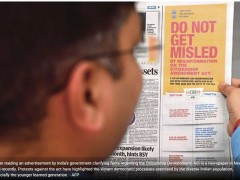News

Insight on Kerala's inclusiveness
Date : 28 December 2019
Reported by : Roslan Bin Rusly
Category : News
Tweet This
AS I landed in Kochi in Kerala, I was somewhat anxious for two reasons. One, because it was my first time in this part of India. And I have read a lot about how different it is.
The other was because of the “chaos” attributed to the Citizenship (Amendment) Act (CAA) issue that seemed to have consumed the country lately. And how different would Kerala be?
The first part of my anxiety vanished very fast as I engaged with the orderly and friendly immigration services despite it being past midnight. This was relative to my other experience in a neighbouring state just a few months ago. In fact, the anxiety turned into excitement by the time I arrived at the baggage claim area.
Upon reading the pronouncement that the Cochin International Airport is the “world’s first airport to be fully powered by solar energy”, I almost flipped.
Unbelievable! Back home, we have not broached such topics yet, although Malaysia supposedly is on the threshold of becoming a “developed” nation. From then on, the rest of the trip was just as enriching to see how Kerala made real her version of inclusiveness and “shared prosperity”. And, the handling of the CAA issue.
The CAA was confounding to most, judging by the build up from the previous day. The New Indian Express (Dec 21) front-paged the headline: “UP on the boil as 9 dead with gunshot injuries”, although police claimed that they did not “open fire”. In smaller print below it, the report read: “Protests in different parts of Kerala. As many as 25,000 attend a massive (peaceful) rally at Perumbavoor”.
What seems pressing to the Keralites, though, was the allegedly “illegal” arrest of seven of its media people while working in a neighbouring state. “We were treated like criminals for doing our job,” claimed one of those arrested.
No less, reportedly, the chief minister intervened, engaging his counterpart in the said state: “The Government of Kerala expresses its deepest concern at the turn of events. I request your kind intervention.”
So, too, the state police chief vis-a-vis his counterpart in securing the safe release. This was eventually obtained in no time.
Other media personnel were jointly critical over the incident. An opposition leader even labelled it “a kind of state-sponsored terror” and “declaration of war against democracy”.
As I browsed the headlines of other mainstream dailies, my anxiety flared up several notches. For example, The Times of India posed: “In Delhi, day of peaceful stir ends on violent note”, saying at least 45 people, including 12 cops, were allegedly injured. The Times’ editorial, however, pointed out an interesting observation, where “India is doing some things right by its daughters”.
Despite the “horror” of sexual assaults that often grip the nation, the anti-CAA and related protests captured the “voices of female students” across university campuses in a “strong and compelling” way.
“Some have been in burqa, some in hijab, there have been plenty of jeans, shalwars, and saris too,” noted the editorial, implying that the issue cuts across the artificial boundaries of race, class and religion.
To this, Sonia Gandhi, the Congress Party president, expressed “solidarity with the students and citizens of India in their just struggle”. In her statement, she described as “spontaneous” the protests across universities and leading academic institutions against the “divisive agenda and anti-people policies”.
In another development, The Hindu (Dec 21) reported of a gold medallist recipient who “rejected” the award from a prominent Indian university to register her protest and to push for the withdrawal of the CAA.
She said: “It is my democratic right to protest against a law which is against humanity and unconstitutional. I will not accept the degree until the government withdraws the legislation.”
Another scholar, too, decided to do the same to express his “anger against the CAA” as well as the way the crackdown was executed in New Delhi where the students rallied. “I will get it (the degree) once the ‘government agrees to amend the wrong done to the country’,” he explained. Their expressions were more “sophisticated”, academically speaking, in contrast with what took place recently at Malaysian universities, which lacked finesse.
As I left for home the next day, my anxiety was somewhat soothed given the vibrant democratic processes that unfolded, exercised by the diverse Indian population, especially the younger learned generation who remain vocal across the country. Especially so, in the democratically-elected communist state of Kerala.
It is unlike one of India’s neighbouring countries, where even a foreign football player faced immediate reprisal for speaking out for the minority.
The writer, an NST columnist for more than 20 years, is International Islamic University Malaysia rector
Source : https://www.nst.com.my/opinion...








